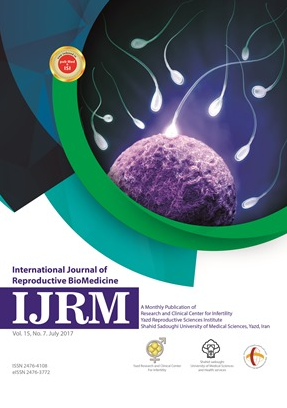
International Journal of Reproductive BioMedicine
ISSN: 2476-3772
The latest discoveries in all areas of reproduction and reproductive technology.
The effect of hormone replacement therapy on cognitive function in postmenopausal women: An RCT
Published date: Jan 27 2019
Journal Title: International Journal of Reproductive BioMedicine
Issue title: International Journal of Reproductive BioMedicine (IJRM): Volume 16, Issue No. 12
Pages: 767–774
Authors:
Abstract:
Background: During the reproductive age, the human brain becomes a target for gonadal steroid hormones. Estrogens influence neural function through effects on neurons and affects indirectly the oxidative stress, inflammation, the cerebral vascular and the immune system.
Objective: To evaluate the effect of the traditional hormone replacement therapy (HRT) on the cognitive function in postmenopausal women.
Materials and Methods: In this randomized clinical trial, 140 postmenopausal women, from November 2014 to February 2015, were included. Women were randomly divided into two groups. Each woman in the case group took traditional HRT (0.625mg conjugated equine estrogens+2.5mg medroxyprogesterone acetate daily) plus one Cal+D tablet (500 mg calcium+200 IU vitamin D) daily for four months. Women in the control group received only one Cal+D tablet (500 mg calcium+200 IU vitamin D) daily for four months period. The Montreal Cognitive Assessment (MoCA) and Green Climacteric Scale (GCS) questionnaires filled out after the intervention and compared between the two groups.
Results: The mean points of the MoCA after the intervention indicate that all MoCA domains except for the orientation improved in the case group. There was a significant difference in the memory domain after the treatment between the two groups. MoCA domains and GCS were negatively correlated after the intervention (r = −0.235, p = 0.006).
Conclusion: The HRT has affected some of the MoCA factors. The effects of HRT on cognitive function should be studied in a large prospective study in a group of women in their early and late menopausal ages with periodic assessment of their cognitive function during these follow-up years.
Key words: Streptococcus agalactiae, Iran, Pregnancy, Prevalence, Female.Key words: Cognition, Hormone replacement therapy, Postmenopausal women.
References:
[1] Nguyen TV, Ducharme S, Karama S. Effects of sex steroids in the human brain. Mol Neurobiol 2017; 54: 7507–7519.
[2] Sturdee DW, Pines A, International Menopause Society Writing Group, Archer DF, Baber RJ, Barlow D, et al.
Updated IMS recommendations on postmenopausal hormone therapy and preventive strategies for midlife health.Climacteric 2011; 14: 302–320.
[3] Greendale GA, Wight RG, Huang MH, Avis N, Gold EB, Joffe H, et al. Menopause-associated symptoms and cognitive performance: results from the study of women’s health across the nation. Am J Epidemiol 2010; 171: 1214–1224.
[4] Etgen T, Sander D, Bickel H, Forstl H. Mild cognitive impairment and dementia: the importance of modifiable
risk factors. Dtsch Arztebl Int 2011; 108: 743–750.
[5] Karlamangla AS, Lachman ME, Han W, Huang M, Greendale GA. Evidence for cognitive aging in midlife women: study of women’s health across the nation. PLoS One 2017; 12: e0169008.
[6] Pimenta F, Leal I, Maroco J, Ramos C. Menopausal symptoms: do life events predict severity of symptoms in periand post-menopause? Maturitas 2012; 72: 324–331.
[7] Goveas JS, Espeland MA, Hogan P, Dotson V, Tarima S, Coker LH, et al. Depressive symptoms, brain volumes
and subclinical cerebrovascular disease in postmenopausal women: the Women’s Health Initiative MRI Study. J Affect Disord 2011; 132: 275–284.
[8] Goveas JS, Espeland MA, Woods NF, Wassertheil-Smoller S, Kotchen JM. Depressive symptoms and incidence of mild cognitive impairment and probable dementia in elderly women: the Women’s Health Initiative Memory Study. J Am Geriatr Soc 2011; 59: 57–66.
[9] Rapp SR, Legault C, Henderson VW, Brunner RL, Masaki K, Jones B, et al. Subtypes of mild cognitive impairment in older postmenopausal women: the Women’s Health Initiative Memory Study. Alzheimer Dis Assoc Disord 2010;24: 248–255.
[10] Mitchell ES, Woods NF. Cognitive symptoms during the menopausal transition and early postmenopause. Climacteric 2011; 14: 252–261.
[11] Etgen T, Bickel H, Forstl H. Metabolic and endocrine factors in mild cognitive impairment. Ageing Res Rev 2010; 9: 280–288.
[12] Maki PM, Henderson VW. Hormone therapy, dementia, and cognition: the Women’s Health Initiative 10 years on.Climacteric 2012; 15: 256–262.
[13] Scali J, Ryan J, Carriere I, Dartigues JF, Tavernier B, Ritchie K, et al. A prospective study of hormone therapy
and depression in community-dwelling elderly women: the Three City Study. J Clin Psychiatry 2010; 71: 1673–1679.
[14] Ratka A. Menopausal hot flashes and development of cognitive impairment. Ann N Y Acad Sci 2005; 1052: 11–26.
[15] Nasreddine ZS, Phillips NA, Bedirian V, Charbonneau S, Whitehead V, Collin I, et al. The Montreal Cognitive Assessment, MoCA: a brief screening tool for mild cognitive impairment. J Am Geriatr Soc 2005; 53: 695–699.
[16] Emsaki G, Molavi H, Chitsaz A, Movahed Abtahi M, Asgari K. [Psychometric properties of the montreal cognitive assessment (MoCA) in parkinson’s disease patients in Isfahan]. J Isfahan Med Sch 2011; 29: 1391–1400 (inPersian).
[17] Greene JG. A factor analytic study of climacteric symptoms. J Psychosom Res 1976; 20: 425–430.
[18] Henderson VW, St John JA, Hodis HN, McCleary CA,Stanczyk FZ, Shoupe D, et al. Cognitive effects of estradiol
after menopause: A randomized trial of the timing hypothesis. Neurology 2016; 87: 699–708.
[19] Gleason CE, Dowling NM, Wharton W, Manson JE, Miller VM, Atwood CS, et al. Effects of hormone therapy on
cognition and mood in recently postmenopausal women:findings from the randomized, controlled KEEPS-Cognitive and affective study. PLoS Med 2015; 12: e1001833.
[20] Fischer B, Gleason C, Asthana S. Effects of hormone therapy on cognition and mood. Fertil Steril 2014; 101: 898–904.
[21] Girard R, Metereau E, Thomas J, Pugeat M, Qu C, Dreher JC. Hormone therapy at early post-menopause increases cognitive control-related prefrontal activity. Sci Rep 2017;7: 44917.